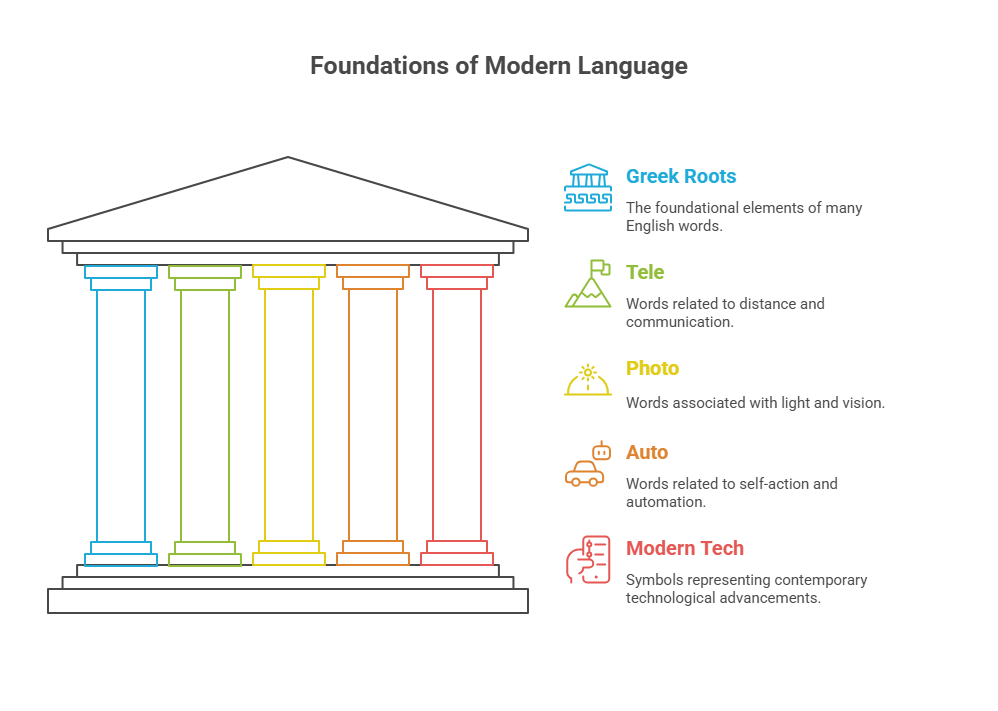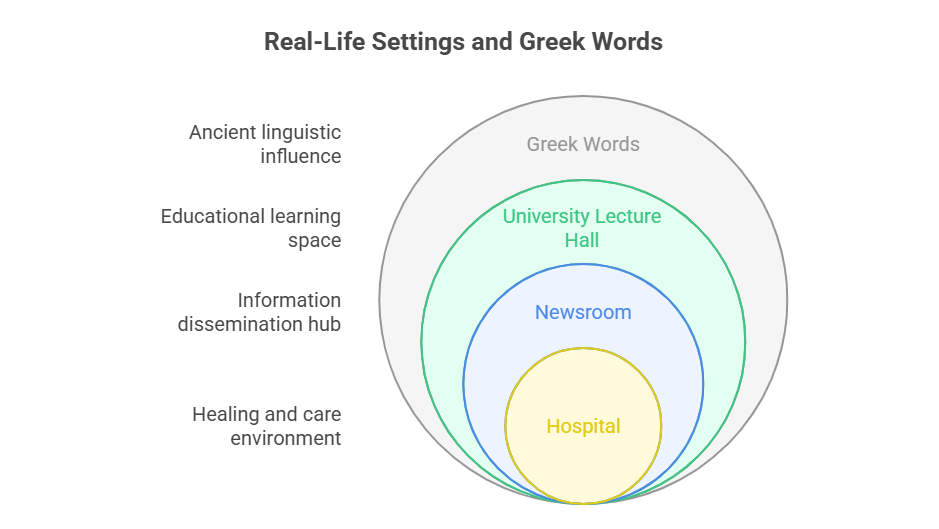How to understand English better by learning Greek words is a question many students, writers, and curious learners often ask. You see complex words in textbooks, news, or even tech apps—and they don’t always make sense.
That’s because many of these words come from Ancient Greek, and without knowing the roots, they feel confusing or overwhelming.
As the founder of LatinPerDiem, I’ve taught classical languages to thousands of learners worldwide. In this article, I’ll show you how Greek words shape modern English, why that matters, and how spotting common roots can make reading and writing easier. You’ll walk away with simple examples, smart learning tips, and tools to help you think more clearly—one Greek root at a time.
Key Takeaways
- Greek roots are everywhere. Words like photo, tele, and auto are part of daily English, often without us noticing.
- Knowing Greek roots makes learning easier. Once you understand common roots, you can guess word meanings quickly—even with complex terms.
- Greek shaped modern language. From ancient scholars to today’s science and tech, Greek roots helped build the vocabulary we use now.
- Different fields use different roots. Science uses bio- and micro-; politics uses polis and democracy; tech uses graph- and chrono-.
- You can spot roots with simple clues. Look for patterns like ph = f and familiar word parts (prefixes, suffixes).
- Avoid mixing word roots. Don’t combine Latin and Greek parts in one word—it sounds awkward and breaks word logic.
- Free tools can help. LatinPerDiem’s lessons and printables give you fast, simple ways to learn and remember Greek roots.
What Are Greek Words in English?
Greek words in English are terms borrowed or built from Greek roots, often seen in science, technology, medicine, and daily speech. Words like photo, auto, and television all come from Greek root words. These parts help you understand meaning faster and grow your vocabulary.
How Greek Words Shape Modern English: Facts & Findings
Understanding Greek words in English isn’t just academic—it’s a proven way to improve language skills, writing clarity, and comprehension across fields.
Key Statistics & Data
| Fact | Detail |
| Over 150,000 English words | Include Greek or Latin roots (Oxford English Dictionary) |
| More than 60% | Of scientific and medical terms in English come from Greek roots |
| Students who learn root words | Score higher in vocabulary and reading comprehension tests (National Reading Panel) |
| Top Greek roots in English | tele-, photo-, bio-, graph-, auto-, chron- |
| Global relevance | English learners in over 100 countries encounter Greek-rooted terms in tech and medicine |
What Are Greek Words in English?
Greek words in English are terms that come from Ancient Greek roots, often found in everyday language, science, and writing. These word parts—like photo- (light), auto- (self), or graph- (write)—carry meaning even when used in longer, more complex words.
At LatinPerDiem, we make this simple. Think of photo- as meaning “light.” You’ll see it in photography, photosynthesis, or even a photo booth. Once you spot the root, the full word becomes easier to understand.
Learning Greek roots is like having a shortcut. Instead of guessing word meanings, you can break them down by part. This helps you read faster, write with more clarity, and grow your vocabulary without memorizing everything.
Understanding Greek roots doesn’t just help students—it helps anyone who wants to use English clearly and confidently. Want an edge in school or writing? Start with the roots.
Why Greek Matters: History & Influence
Many of the Greek words in English didn’t come straight from Greece to your notebook. They traveled through time—from Ancient Greek to Latin, through medieval scholars, and finally into modern English.
In Ancient Greece, thinkers like Aristotle and Plato shaped language that scholars across Europe would later study and pass on. Latin absorbed many Greek roots, and those words entered English during the rise of science, religion, and education in the Middle Ages.
At LatinPerDiem, we believe anyone can learn this. Our goal is to make classical languages accessible to everyone, not just experts. That’s why we break down tough-looking words and show you how simple their roots really are.
Take tele- as an example. It means “far” in Greek. This tiny root now lives in words like television, telecommute, and telephone. Once you understand tele-, you unlock meaning in dozens of common words—without a dictionary.
Greek Word Categories in English
Many Greek words in English fall into clear groups, based on where they’re used. These categories make it easier to learn, remember, and apply them. Let’s look at three main areas: science, philosophy, and everyday use.
Science & Medicine
In science and health, Greek roots are everywhere. Think of:
- bio- (life): biology, biography
- micro- (small): microscope, microbiology
- cardio- (heart): cardiology, cardiovascular
These roots are used because early science was shaped by Greek texts. You’ll see them in textbooks, research papers, and daily news. Once you know what they mean, even tricky terms become clear.
Philosophy, Politics & Arts
Greek thought shaped the way we talk about ideas and society:
- logos (reason, word): logic, dialogue
- ethos (character): ethics, ethos
- polis (city): politics, metropolis, democracy
At LatinPerDiem, we often explore these in courses that touch on Plato, Aristotle, and early democratic ideas. Understanding the root helps you see how language expresses complex values.
Everyday Language & Tech
You use Greek roots daily—maybe without knowing it:
- photo- (light): photography, photogenic
- graph- (write): autograph, paragraph
- chrono- (time): chronology, synchronize
- auto- (self): automatic, autobiography
Our Moss Method teaches Greek prose using real texts, so you recognize these roots from day one. When you read, speak, or write, you’ll spot these pieces working together—like word puzzles with meaning built in.
How to Spot Greek Roots in English
Learning how to spot Greek roots in English can make reading and writing much easier. You don’t need to memorize full words—just look at how they’re built.
Step-by-Step Guide:
- Start with prefixes – Look at the beginning of the word (like tele- or bio-).
- Check the ending – Many Greek-based words end in -logy (study), -graph (write), or -cracy (rule).
- Break it down – Divide the word into parts and match each to a meaning.
- Look for sound clues – Greek words often use “ph” instead of “f” and “ch” for a hard “k” sound.
You’ll spot these roots in science, tech, and everyday talk. Once you know them, complex words feel much simpler—like shortcuts to meaning. Start by noticing just one root each day, and you’ll build stronger language skills fast.
Common Myths & Mistakes to Avoid
When it comes to Greek words in English, a few common misunderstandings can trip you up. Let’s clear them up so you can feel more confident using and spotting Greek roots.
Myth: “All big words come from Greek”
Not true. While many long words do use Greek roots, others come from Latin, Germanic, or even French. For example, the construct is Latin, not Greek. So, if a word sounds complex, don’t assume it’s Greek—check the root.
Mistake: Mixing roots that don’t match
Some words blend Greek and Latin in ways that feel unnatural or forced. While you might hear it used, it’s a mix of parts that don’t quite fit.
At LatinPerDiem, we encourage careful use of roots so words stay clear and meaningful. Stick to the right building blocks, and your writing stays sharp and correct.
Real-Life Examples & Case Studies
Seeing Greek words in English in action helps you understand how they work—and why they matter. Here are a few real-world uses that show the power of Greek roots in everyday language and professional writing.
LatinPerDiem is a lifesaver! The short daily lessons, clear explanations, and variety of texts make the program ideal for a busy high schooler. My younger siblings regularly ask to watch the videos with me, and Dr. Noe’s videos cater to each of our knowledge levels. I was very pleasantly surprised to find such professional work available for free. Laurel E.
LatinPerDiem is a refreshing use of technology in the service of humanistic education. My favorite aspect of the video series is Professor Noe’s commitment to clear and meticulous analysis of Greek and Latin texts. His explanations are accessible to new readers, yet still instructive for those with more experience. In general, LatinPerDiem provides one an opportunity to become more acquainted with the Western canon (or, for students, to work through one’s reading list) simply by watching a short video every day. Michael V.
Tools, Resources & Learning Aids
Want to learn Greek words in English the easy way? At LatinPerDiem, we’ve built tools that fit your schedule and learning style. Whether you’re a student, writer, or curious reader, these resources can help.
What You Can Use Today:
- Greek Courses: Learn at your pace with bite-sized lessons from our Moss Method. Each lesson focuses on real Greek texts and root words you’ll actually use.
- YouTube Channel: Watch our growing library of short, clear Greek lessons. Great for visual learners.
These tools are designed to help you spot Greek roots, write smarter, and feel confident using the language. Whether you’re just starting or sharpening your skills, everything is built to keep it simple, direct, and useful.
Conclusion
Learning Greek words in English helps you write with more clarity and confidence. Greek roots like tele-, photo-, and auto- make even complex words easier to understand and use. Whether you’re a student, a writer, or a curious reader, these roots give you an edge.
Frequently Asked Questions
What’s the benefit of learning Greek roots if I already speak English?
Learning Greek roots helps you decode complex words more quickly. Even if you’re fluent in English, understanding roots like tele- (far) or bio- (life) gives you an edge when reading academic texts, writing essays, or understanding tech and medical language. It's like learning shortcuts that improve vocabulary and comprehension without memorizing entire word lists.
Is this useful only for students, or can adults benefit too?
Greek roots aren’t just for students. Adults in fields like writing, journalism, healthcare, and even casual reading benefit from understanding word origins. If you’ve ever struggled with long words in the news, at work, or in books, learning the roots can make reading more intuitive and your writing clearer.
Are Greek roots only used in science and medicine?
No—they appear across all kinds of language. While fields like science and medicine use Greek roots heavily (think biology, cardiology, microscope), you’ll also see them in everyday terms like autograph, photograph, and dialogue. Understanding their meaning helps in everyday conversations and professional writing alike.
What’s the fastest way to learn and remember Greek roots?
Start with one root per day—like chrono- (time) or graph- (write)—and find 3–4 words that use it. Use resources like LatinPerDiem’s printable guides or YouTube videos. These tools make it easier to practice in short bursts, which builds long-term memory without stress.




